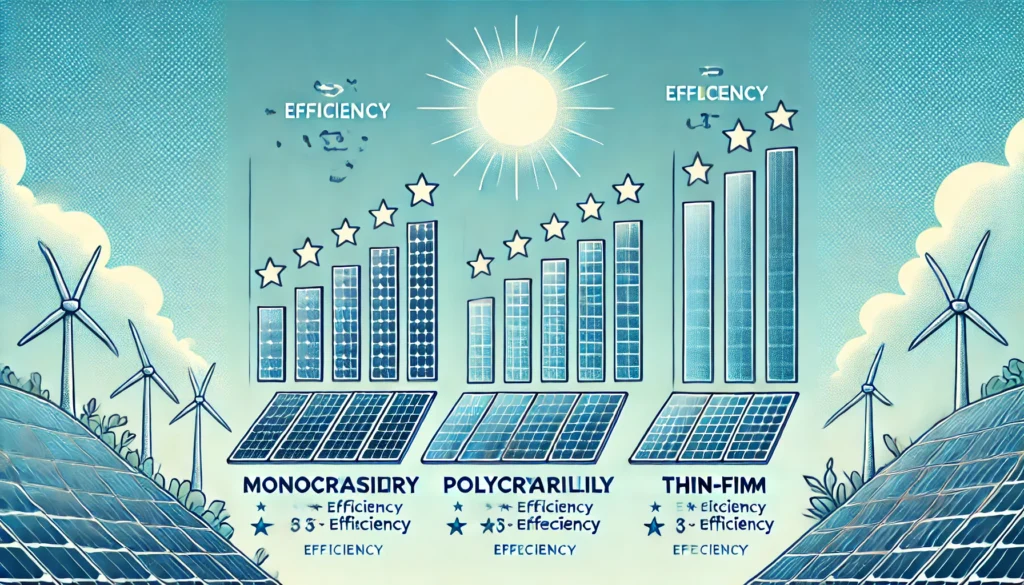Types of Solar Panels and Their Efficiencies
Thinking about installing solar panels but unsure which type is best for your home? The type of solar panel you choose can have a significant impact on the efficiency, cost, and overall performance of your solar system. Here, we’ll explore the three main types of solar panels—monocrystalline, polycrystalline, and thin-film—to help you make an informed decision.
- Monocrystalline Solar Panels
Monocrystalline solar panels are known for their high efficiency and sleek appearance, making them a popular choice for residential installations.
- Construction and Efficiency: These panels are made from a single, pure silicon crystal, which gives them a uniform structure. This design allows them to achieve higher efficiency rates, typically between 18% and 22%. The single-crystal structure enables better electron movement, which means more sunlight is converted into usable electricity.
- Cost: Monocrystalline panels are generally more expensive than other types, but their high efficiency can make them a cost-effective choice for homeowners who need to generate maximum power from a smaller space.
- Ideal Use: Due to their high efficiency, monocrystalline panels are ideal for homes with limited roof space or homeowners looking to generate the most electricity per square foot. They’re also durable, with a long lifespan of 25 years or more, making them a solid long-term investment.
Best Fit: If you have a smaller roof or need maximum efficiency to power your home, monocrystalline panels are an excellent choice.
- Polycrystalline Solar Panels
Polycrystalline panels are widely used in residential and commercial solar installations and are valued for their balance of cost and performance.
- Construction and Efficiency: Polycrystalline panels are made from silicon fragments, which are melted and formed into square-shaped wafers. This manufacturing process is more affordable, resulting in lower costs but slightly lower efficiency, typically between 15% and 17%. The fragmented silicon structure is less efficient at moving electrons than a single-crystal structure, resulting in lower power output.
- Cost: These panels are generally more affordable than monocrystalline panels, making them an attractive option for budget-conscious homeowners.
- Ideal Use: Polycrystalline panels are well-suited for homes with ample roof space where slightly lower efficiency is not a significant issue. They perform well in moderate climates, though their performance may decrease slightly in very high temperatures.
Best Fit: If you have more roof space available and want a cost-effective option, polycrystalline panels offer a good balance of affordability and efficiency.
- Thin-Film Solar Panels
Thin-film solar panels are different from traditional silicon-based panels, offering unique benefits for specific applications.
- Construction and Efficiency: Thin-film panels are made from various materials, including cadmium telluride (CdTe) and amorphous silicon. They are constructed by placing thin layers of photovoltaic material onto a base like glass or plastic, resulting in a lighter, more flexible panel. Efficiency rates for thin-film panels are generally lower, around 10% to 12%, although some newer technologies are reaching up to 15%.
- Cost: Thin-film panels are typically the most affordable option, thanks to lower production costs. However, their lower efficiency means they require more space to generate the same amount of electricity as crystalline panels.
- Ideal Use: These panels are ideal for large areas with sufficient space, such as commercial rooftops or properties with unconventional surfaces. They are also an excellent choice for projects where weight is a concern, like on rooftops with lower load-bearing capacity.
Best Fit: If you have a large area available for installation and are looking for a budget-friendly option, thin-film panels could be a great solution.
Comparing Solar Panel Types: Efficiency, Cost, and Suitability
Each type of solar panel offers unique benefits depending on your budget, available space, and energy goals. Here’s a quick comparison to help you decide:
| Panel Type | Efficiency | Cost | Ideal For |
| Monocrystalline | High (18%–22%) | Higher | Small roof spaces, high energy output needs |
| Polycrystalline | Moderate (15%–17%) | Moderate | Ample roof space, balanced cost and efficiency |
| Thin-Film | Low (10%–12%) | Lower | Large installations, flexible surfaces, lower cost |
When choosing the right solar panel for your home, consider factors like roof space, budget, and desired efficiency. Here’s a breakdown of which panel might be the best choice based on your specific needs:
- Smaller Homes or Limited Roof Space: Monocrystalline panels are ideal, as they offer the highest efficiency, allowing you to generate maximum power from a small area.
- Budget-Conscious Homeowners: Polycrystalline panels are an excellent balance of cost and performance, making them a reliable choice for those who have more roof space available.
- Large Areas and Flexibility Needs: Thin-film panels are ideal for large rooftops or unconventional surfaces where weight and flexibility are a concern.
Conclusion
Understanding the different types of solar panels and their efficiencies helps you make an informed decision that aligns with your energy needs, budget, and home setup. Whether you’re looking for maximum efficiency, a balanced budget option, or a lightweight panel for large spaces, there’s a solar panel type that fits your requirements. Now that you know more about monocrystalline, polycrystalline, and thin-film panels, you’re ready to choose the perfect solar solution for your home. Reach out to our team today to learn more and take the next step toward sustainable, solar-powered living!
Shyne specializes in installing and financing solar panels, making the transition to solar energy seamless for homeowners. Our team of experts ensures that each installation is optimized for maximum efficiency and savings.
Shyne is your trusted partner for solar panel installation and financing in Oklahoma. Get a free quote today! Contact Us
Ready to make the switch?
Contact us today to learn how solar panels can help you save more in the long run!
Complete Residential Solar Panels and Systems. Serving Texas, Oklahoma, Kansas, Missouri, Utah, Florida & Ohio
Get a Free Quote Now
